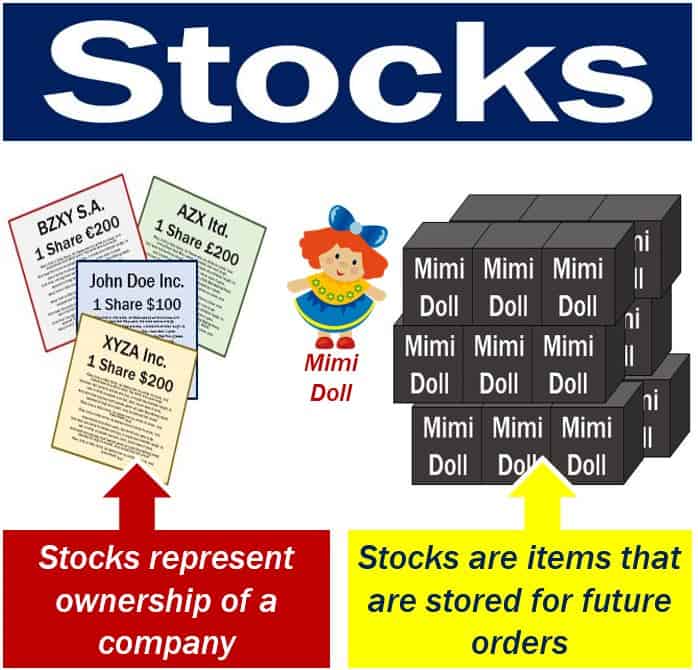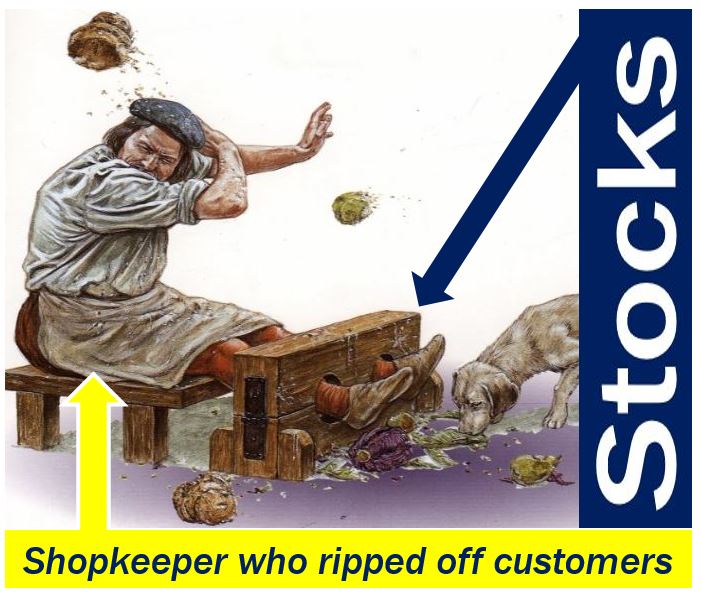The word stocks in the world of business has two meanings:
- Company shares – specifically common stock. Also the proportional part of a firm’s equity capital represented by fully paid-up shares.
- Inventory of goods – stored products that companies keep to meet future demand.
In the United Kingdom and most Commonwealth nations, people refer to common stock as ordinary shares.
When stocks refer to shares, it may refer to any type of security that represents ownership of a business and signifies a claim on part of the company’s assets and earnings – either common or preferred shares. The owner of common stock (common shares) is entitled to receive dividends and to vote at shareholders’ meetings.
Convertible Preferred Stocks are preferred shares with an option to convert them into a fixed number of common shares – generally at any time after a specified date.
In the United Kingdom, Government Stock refers to one of the bonds the government sells to finance its budget deficit, i.e. government bonds.
The expression ‘stocks and shares’ is commonly used to refer to ownership interests in a company.

Other meanings of Stock or Stocks
In Cuisine: the stock is a liquid used to add flavor to meals – it is made by boiling poultry, meat, fish (fish bones), or vegetables in water. When you make stock, you simmer the raw ingredients, and then remove the solids – what you have left is a highly flavored liquid, i.e. stock.
On the Stocks: this is a common term used in shipbuilding – it means ‘under construction’. The term is sometimes used more widely, i.e. outside of shipbuilding.
Stock Company: this is a group (troupe) of actors who perform frequently at a specific theater. The company presents a different play nightly from its repertoire of previously-prepared productions. The stock system first appeared in Elizabethan England. It spread to New York, Boston, and Philadelphia in the United States in the early 1800s.
Stocks as Punishment Devices: were used in medieval, Renaissance, and colonial American times. Stocks had two or three holes – two for just your feet, and three if your head was immobilized too (see image below). The person being punished was exposed in a public place – passers-by could (and often would) throw rotten food at the punished person. Shopkeepers and merchants who ripped off their customers risked having their feet and head fastened in the stocks.
The etymology of stock or stocks
Etymology is the study of the origin of words, and how their meanings have evolved throughout history. A person who specializes in etymology is an etymologist.

According to Etymonline.com, the verb to stock with the meaning ‘to supply (a store) with stock’, appeared in the English language in the 1620s. To ‘imprison in stocks’ dates back to 14th-century England.
As a noun, with the meaning ‘supply for future use’, the word stock first appeared in the English language in the 15th century. By the middle of the 15th century, it also meant ‘a sum of money’.
By the 1610s, the term in stock started being used with the meaning ‘in the possession of a trader’.
Etymologists say the term stock meaning ‘broth made by boiling vegetables or meat’ dates back to 1764.
In 1761, the term’s meaning widened to include a theatrical company regularly acting together at a specified theater.
With the meaning ‘to regard as important’, the term to take stock appeared in 1870.
In the 1510s, the term livestock – meaning ‘farm animals’ – emerged.
The old English word stocc, meaning ‘tree trunk, log, stake, post or stump’, came from Proto-Germanic stukkaz, meaning ‘tree trunk’, as well as the Old Norse word stokkr for a ‘block of wood, trunk of a tree’.
Old Saxon, Old Frisian, Middle Dutch, and modern Dutch and German all have similar stock-sounding words meaning tree trunk, stump, stick, or cane.
Some shares are very popular because the press likes them and analysts forecast the great potential. Those that belong to this best stocks list are what we call glamour stocks. However, if they lose their ‘glamour,’ they often crash.
In addition to traditional stock trading, the rise of digital platforms has led to increased accessibility for individual investors, allowing for more diverse and flexible investment strategies in the stock market.
Video – What are Stocks?
This video presentation, from our YouTube partner channel – Marketing Business Network, explains what the term ‘Stocks’ means using simple and easy-to-understand language and examples.
